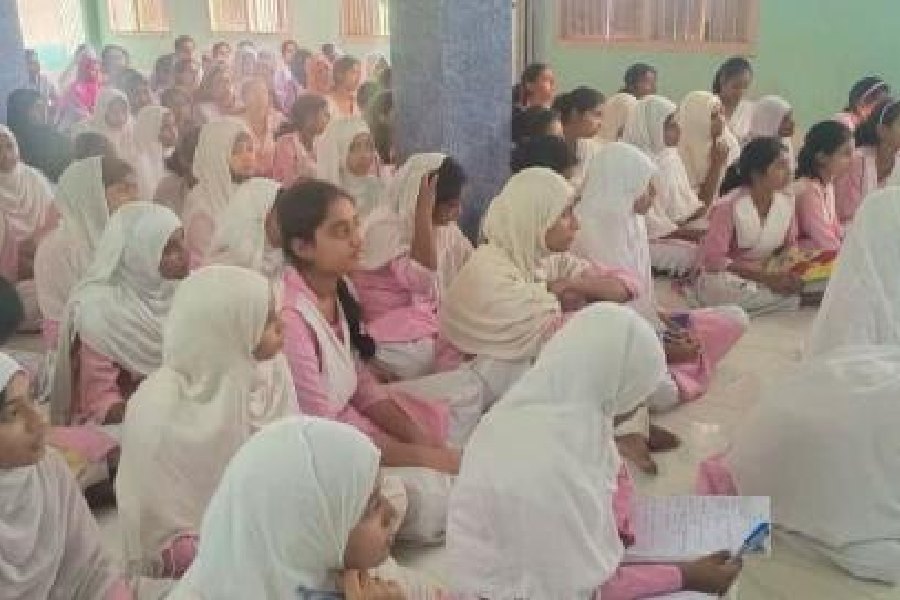A madrasa in Murshidabad has been conducting science seminars and fairs to encourage more of its girls to take up science or sustain the interest of those who have chosen the stream.
Of the 216 girls in Class XI, 70 have joined the science stream and of another 220 in Class XII, 72 are studying science at Debkunda Sk Abdur Razzak Memorial Girls High Madarsah in the Beldanga block of Murshidabad.
The school sent out their first higher secondary (HS) batch in 2024.
Almost every girl in the school fights poverty, proposals of early marriage, and also resistance to study and yet they continue, said the school head.
Many girls cannot take up science because it becomes a financial burden to study the subjects, said Murshida Khatun, headmistress of the school.
The girls need additional tutorial help which becomes difficult for the family to afford, many of whom struggle to make ends meet, a school official said.
"We keep conducting science seminars and science fairs to encourage more and more girls to take up science. As a new school offering higher secondary, we have some challenges like lack of teachers and proper infrastructure like labs in the school but we try to organise workshops or seminars or invite retired teachers or other guest speakers to talk to our girls," said Khatun.
This week the Indian National Science Academy, a central government-recognised institute, as part of their as part of their "science popularisation programme in remote areas" conducted a lecture on the "mystery of the missing particle" in the school.
Class XI science students and Classes VIII, IX and X students attended the lecture.
"The questions that the girls asked showed that they were curious about the subject. Programmes like these help in strengthening their interest in science," said Srubabiti Goswami, senior professor at Physical Research Laboratory in Ahmedabad.
Goswami spoke to the girls about neutrino, a subatomic particle.
Till the time the school had higher secondary, there was a demand from the guardians — mostly the mothers — who wanted their daughters to study, something that they could not.
They are studying but the ratio of students opting for science as against humanities is still very lopsided.
"In the villages, where most of them are first-generation learners, they need additional help for science subjects. They do not get teachers and have to travel, which is a deterrent for the girls or their families. It becomes a costlier affair. Whereas if they study humanities they can do on their own and in many cases the scholarship money that some of the meritorious girls get takes care of their education," said Khatun.
Also at play is gender inequality. Many families, in the face of poverty, prioritise the education of boys over girls.
"The boys would be sent out and they would stay in hostels. The girls also accept the fact that their brothers' education will get priority over theirs," said Khatun.
Many girls who take up science cannot continue in the same stream later on.
"They want to get a job sooner than later which they need and hence, they switch to professional courses instead of staying in a research-oriented field. The highly meritorious ones pursue medicine or engineering, which is a handful of them. Those who cannot take up these fields, pursue nursing or other such courses," said Khatun.
Goswami said they have seen that women often have to prioritise their family over research.
"On occasions, PhD research coincides with the biological clock of a woman and she has to prioritise family over her work. It becomes difficult for both husband and wife to get jobs in the same city. But there are still women who manage to work things around and such stories are an inspiration for the girls," she said.











